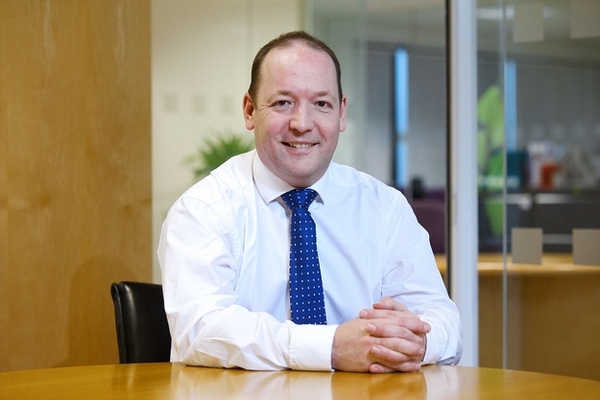You are viewing 1 of your 1 free articles
15 minutes with… Ian Mulheirn
The Tony Blair Institute for Global Change’s latest report calls for major changes to the mortgage market to help boost homeownership. Its policy director sits down with Peter Apps to discuss how the housing crisis could be fixed

Tell us what your latest report is all about.
There’s been a long debate about how to increase rates of homeownership in this country, but one thing that’s been under-discussed is the role the mortgage market plays. We often talk about new housing supply being the answer, but actually it is much more about who can access the money to buy the properties. So we launched this study to look at what is happening with the market and what might be done about it. In this first piece, we look at the broad picture on homeownership and what’s been driving it, before going on to see what other countries do to boost homeownership. In a second report next month, we’ll make proposals for what the UK should do in response.
What have you found out about what’s happening internationally that could be applied in the UK?
We will explore this more in our second report, but probably the things that other countries are doing which could have the biggest impact surround mortgage insurance. Canada, for example, has a big state-backed insurance scheme which means it has a more stable market. One of the problems with the market, which the financial crisis demonstrated, is the wide swings from optimism to pessimism. Banks were not putting away enough money to cover the risks. If you had a mortgage guarantee scheme, it would be easier to maintain a market during the bad times.
Why is that something which hasn’t been tried so far in this country?
We had a mortgage insurance market in the 1980s and early 1990s, but there were massive problems with that. Insurance policies didn’t pay out, so it got a bad reputation mainly because it wasn’t very well designed. If it is going to work, government would have to be the ones to make it happen. The Treasury has dabbled in this sort of thing from time to time, but it is nervous about getting involved in such a major way, including with the current Mortgage Guarantee Scheme.
How positive are you about the chances of the Treasury picking up an idea like this?
I think there’s a lot of interest at the moment in potential solutions. There’s interest in learning from overseas. I think the big question is whether the Treasury would be willing to go this far in terms of how interventionist it sees itself. But the fact is, we have a malfunctioning market and there is a lot they could do to address that.
Your view that supply is not the main driver of the crisis could be seen as controversial. Could you explain your thinking?
First of all, new housing supply is only ever going to do a small amount for prices. Over a generation, you might only make a dent. Secondly, even if you reduce prices, it’s not really price levels that determine who can buy. The question is who gets leant the money. Is a first-time buyer going to get offered a mortgage at the same rate as a buy-to-let landlord? If banks make it more expensive for the first-time buyers, then inevitably the make-up of who owns properties will change. Deposit requirements from the banks are the biggest single factor, which means young people are unable to afford mortgages.
The problem is that in a liberalised global capital market, where interest rates are very low, it’s hard for the policy-makers to do much about house prices. Of the policy options the government has, it seems to believe that supply is the only major thing it can do to raise homeownership. There’s a failure to understand how much of a role the mortgage market plays. I’m not anti new supply. I just don’t think it’s the solution. Sometimes people think you are denying the problem exists, but that’s not what I’m doing. I just don’t think there’s much value in saying something will be a solution when the best available data suggests it won’t be.
What role, if any, do you think the development of new social housing should play?
I think the role of social housing remains a large one. We have a situation where the number of families in the private rented sector has tripled. That sector provides no security and there’s an obvious role for the social rented sector in alleviating that problem. I think I would advocate a three-pronged strategy: expand the social housing sector, sort out security of tenure in the private rented sector and intervene in the mortgage market to make homeownership available to those for whom it is a realistic possibility. These don’t need to be things which are in conflict with one another.
‘15 minutes with…’ series
In our ‘15 minutes with…’ series, we have a quick chat with the biggest names in the sector about the most important issues.
Previously, we have featured:
Barbara Brownlee, chief executive of Soho Housing
Eddie Hughes, former minister for rough sleeping and housing
Geeta Nanda, chief executive of Metropolitan Thames Valley Housing
David Bogle, chair of Homes for Cathy
Laurence Carr, money coach at Yorkshire Housing
Dinah Roake, chair of the London Housing Panel
Sheron Carter, chief executive at Hexagon
Helen Spencer, executive director of growth at Great Places
Julie Wittich, executive director of assets and sustainability at Accent
Ian Mulheirn, executive director of policy at the Tony Blair Institute for Global Change
Kevin Ruth, chief executive of Together Housing
Piers Williamson, chief executive of The Housing Finance Corporation
Seyi Obakin, chief executive at Centrepoint
Fayann Simpson, senior independent director at L&Q
Mark Perry, chief executive at Vivid
Rose Bean, executive director of assets and sustainability at Abri
Ruth Cooke, chief executive at GreenSquareAccord
Ben Denton, managing director at L&G Affordable Homes
Simon Dudley, chair at Ebbsfleet Development Corporation
Emma Palmer, chief executive at Eastlight Community Homes
Tracy Harrison, chief executive at Northern Housing Consortium
Sign up for our daily newsletter
Already have an account? Click here to manage your newsletters












